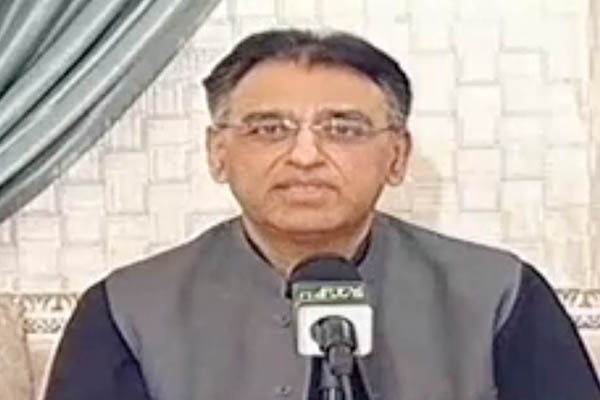
File photo
Planning minister urges public to adopt preventative measures or risk a situation worse than peak of last year’s first wave of pandemic
Warning that people don’t seem to realize how dangerous the current coronavirus situation is, Planning Minister Asad Umar on Saturday warned that the government will have no choice but to implement harsher restrictions if the ongoing third wave of the pandemic is not brought under control.
Addressing a press conference after an “emergency” meeting of the National Command and Operation Center (NCOC)—called to review the rampant rise in infections in Punjab, Khyber-Pakhtunkhwa, Islamabad and Pakistan-administered Kashmir—he said the public was not adopting preventative measures to the extent they should be. “The enforcement of SOPs [standard operating procedures] is also not as stringent as it should be,” he added.
Umar, who also heads the NCOC, said the data showed the situation could get much worse if the public continued to ignore preventative measures. “Two weeks ago, we re-imposed restrictions because we could see the pandemic was once more spreading at a dangerous rate,” he recalled. “A week ago, we reviewed the situation and examined how quickly the pandemic was spreading, how effectively SOPs were being implemented,” he said, lamenting that the guidelines were being ignored.
“Perhaps people don’t understand how dangerous the current situation is. The new variants that have emerged, especially the U.K. variant currently spreading through Pakistan, are more infectious and deadlier,” he stressed. Comparing Pakistan’s situation to the rest of South Asia, he said the same variants appeared to be spreading in India and Bangladesh as well.
“We think the situation has reached a dangerous level now because of the hospital admissions,” he said, adding that it was the most important factor due to the pressure it placed on healthcare infrastructure. “In the first wave, the peak of critical care patients was around 3,200 nationwide. In the second wave, the peak was 2,511 critical care patients; so less than the first wave. In the ongoing third wave, it is currently at 2,842,” he said. “More dangerously, in the past 12 days, this number has increased by 1,000. If this rate continues, then within the next week we’ll have crossed the level of the first wave,” he warned.
Noting that while hospitals in major cities hadn’t run out of space yet, he noted that reports had started coming in of people having difficulty securing hospital admissions. “This information is not being shared to spread fear, just to inform the public so we can all work together to overcome this,” he said.
“We have to unite to combat the pandemic by stopping it from reaching a level where people’s livelihoods are impacted,” he said. “If we don’t take immediate steps, we could reach a point where we have to implement further restrictions,” he warned.
“As a nation, once we decide we want to accomplish something, we can get it done. If our political, religious leaderships, our media shares the message and enforcement of guidelines is strengthened, the pandemic can be brought under control,” he concluded.
Pakistan is currently in the midst of a third wave of the pandemic, reporting 4,468 new infections on Saturday—the highest single-day increase since June 22. The bulk of the new cases are being reported from Punjab province, with authorities claiming that public apathy is the primary reason. Government critics blame poor messaging for mass ambivalence, noting that photos of Prime Minister Imran Khan conducting meetings while still under quarantine are suggesting to people that they do not need to avoid meeting other people when they are infected.
